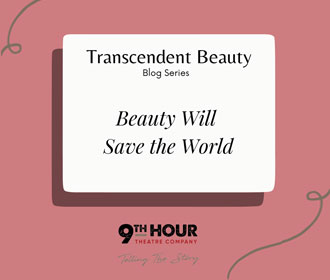The Bane of Beauty
- Details
- Category: Faith & Arts
- Published: Friday, 28 April 2023 11:24
 If 'beauty' is so good, and has the potential to 'save the world', why don't we see more evidence of that? Why do so many of us prefer not to pursue 'beauty' in our lives? Why do we often even prefer it's opposite? What is the opposite of this 'beauty'? Ugliness, of course!
If 'beauty' is so good, and has the potential to 'save the world', why don't we see more evidence of that? Why do so many of us prefer not to pursue 'beauty' in our lives? Why do we often even prefer it's opposite? What is the opposite of this 'beauty'? Ugliness, of course!
In the beginning of Tim Kelly's stage adaptation of Victor Hugo's masterpiece The Hunchback of Notre Dame, the poet / playwright character Pierre Gringoire is commissioned by the King to deliver a play in the court for the public, a play dealing with life and death and passion. To his shock and surprise, the crowd boos and jeers and mocks him, led by the mischievous beggar Clopin, who knows how to manipulate and stir up the other citizens in demanding the crowning of the King of Fools instead of the play, demanding amusing entertainment instead of art that reminds them of life's triumphs and challenges.
PIERRE: Please! Please! Good citizens, if you only permit us to continue, you'll enjoy the play. I know you will. CLOPIN: Enough beauty for one day, my friend. I know what the people of Paris want. Ugliness! PIERRE: No, beauty! Truth! CLOPIN: I'll give you the truth. This is the Festival of Fools and, on this day, we give the crown to the ugliest face in Paris! Come on, there's enough ugliness in this crowd to go around.
In this scene Hugo uses the concepts of 'beauty' and 'ugliness' both literally in a purely aesthetic fashion (crowning the ugliest person), but also thematically and philosophically to speak to the greater human propensity to often prefer 'ugliness' instead of 'beauty' (the very desire and act of the crowd wanting to crown the ugliest person).
The scene goes on with the citizens all wanting to find the ugliest person in the crowd. After many underwhelming attempts, they think they've struck gold at spotting the unsuspecting Quasimodo, who they crown the King of Fools. Defeated and in despair, the poet Pierre walks away and utters his final line of the opening scene.
PIERRE: Beauty! I wanted to give them beauty, and all they wanted was ugliness!
'Ugliness' is perhaps easier to define and observe in everyday life than 'beauty'. 'Ugliness' can be seen all around us in the systems and structures and mindsets that we create and maintain. This 'ugliness' brings division, derision, and devastation in its destructive wake. It is not the physically deformed or aesthetically unappealing thing that we might notice as being 'ugly' in this sense, but those intangible things that we experience. These could be beliefs, social structures, cultural customs, and sometimes even laws that constantly, and often unbeknownst to us, berate us, scare us, shame us, bring us down, oppress, depress, and harass us into a state of mere existence and survival, pitting 'us' against 'them'. 'Ugliness' consists of those things that reduce us to nothing more than bodies and minds that consume, possessing only instrumental value, rather than intrinsically valuable souls that flourish - souls brimming over into acts of generating, creating, inviting and growing.
"If I diminish you, I diminish myself." ~ Desmond Tutu
South African Anglican cleric and theologian, Archbishop Desmond Tutu, known for his work as a human rights and anti-apartheid activist (apartheid meaning a policy or system of segregation or discrimination) famously said "If I diminish you, I diminish myself." One of the greatest forms of 'ugliness' is that which a society inflicts upon an individual, sometimes even in the name of 'progress' or the 'common good'. This reduces the individual to only having instrumental value in the moment rather than immutable intrinsic value that is unconditional. Such 'ugliness' is in fact inflicted upon us all, as we are all inextricably connected. This form of 'ugliness' results in the decline of one's dignity, and is ultimately dehumanizing, potentially leading to exclusion, violence, or even the extinguishing of life itself. Although some forms of 'ugliness' may dissipate or disappear over time, 'ugliness' will always exist in this world, and will unfortunately rear it's "ugly" head in many new forms. It’s part of the human condition.
C.S. Lewis in his book 'The Weight of Glory' writes: “It is a serious thing to live in a society of possible gods and goddesses, to remember that the dullest most uninteresting person you can talk to may one day be a creature which, if you saw it now, you would be strongly tempted to worship, or else a horror and a corruption such as you now meet, if at all, only in a nightmare. All day long we are, in some degree helping each other to one or the other of these destinations. It is in the light of these overwhelming possibilities, it is with the awe and the circumspection proper to them, that we should conduct all of our dealings with one another, all friendships, all loves, all play, all politics. There are no ordinary people. You have never talked to a mere mortal. Nations, cultures, arts, civilizations - these are mortal, and their life is to ours as the life of a gnat. But it is immortals whom we joke with, work with, marry, snub, and exploit - immortal horrors or everlasting splendors.”
When Clopin is speaking, he is not speaking just as an individual but as a representative of a belief about reality (i.e. that it’s ugly) and the systems that are constructed around such beliefs. Lewis provides an alternative belief to Clopin and amplifies what Tutu means when he says you diminish Yourself when you diminish the Other; that we assign dignity and value to each living soul, including the Quasimodo's of this world, because they are immortal beings that will populate eternity. That’s what makes them beautiful.
"There are no ordinary people. You have never talked to a mere mortal. Nations, cultures, arts, civilizations - these are mortal..." ~ C.S. Lewis
The effects of 'beauty' are longer lasting and fulfilling, whereas the effects of 'ugliness' are momentary, shallow, insatiable, and experienced passively. Perhaps 'beauty' that will save the world has a cost to it, and requires something of us, which is why it's easier to accept and choose 'ugliness' instead. When we pursue 'Beauty', we're reminded of Life. When we pursue 'Ugliness', we're distracted from It.
(This is Part 1 of a multi-part blog series about 'beauty', written by 9th Hour Theatre Company. For more Blog posts relating to faith and spirituality intersecting with arts and culture, visit 9thhour.ca/blog)













